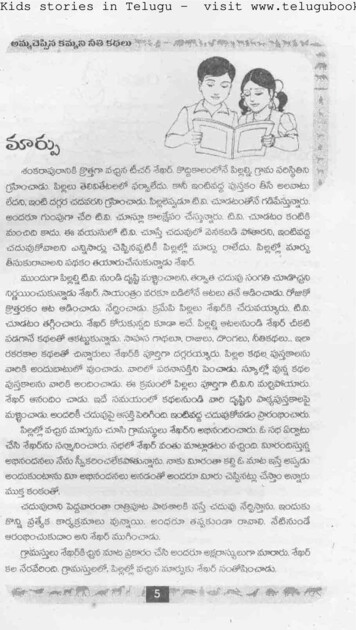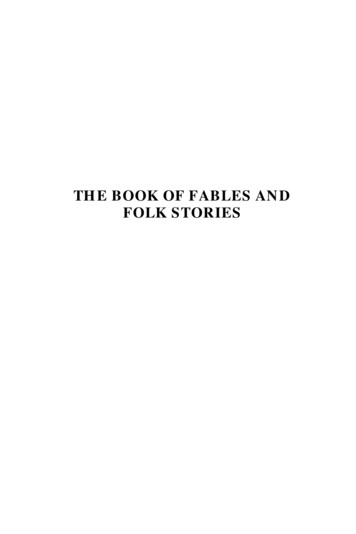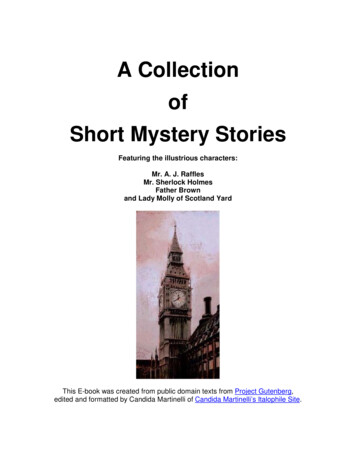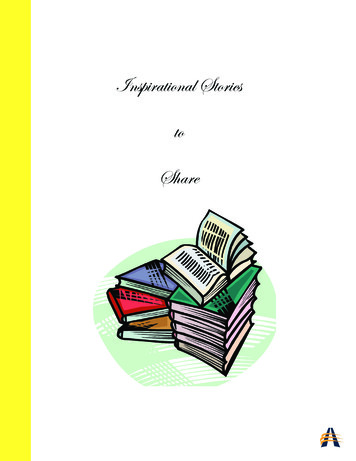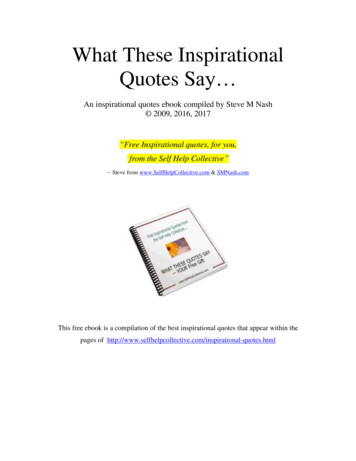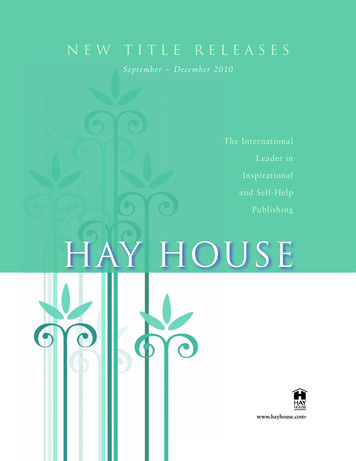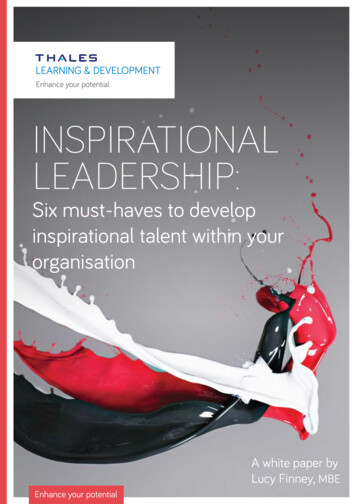
Transcription
AdventureswithGodReal LifeInspirationalStories37Allan David Weatherall
ContentsIntroduction:. iChapter 1: Random Acts of Kindness.1Chapter 2: What is Eritrea? . . 4Chapter 3: The Power of Faith & Hope . 11Chapter 4: Hey, Chuck Norris! . . 14Chapter 5: We’ve Been Expecting You! . 18Chapter 6: On the Road to Jerusalem . 24Chapter 7: Jerusalem . . 28Chapter 8: But, I’m not a Catholic . 32Chapter 9: America. here I come . 37Chapter 10: My Friend, John . .41Chapter 11: Finding God in the Storm . . 45Chapter 12: Trusting God in the War Zone . 49Chapter 13: Jahzal . . 52Chapter 14: The Steadfast Faithfulness of God . 57Chapter 15: Confrontational Love in the Concrete Jungle . 63Chapter 16: Desperate Times, Desperate Prayers . 68Chapter 17: Betrayed . 72Chapter 18: Stumbling Toward the Light . 78Chapter 19: How I Captured Osama . 84Chapter 20: 1978 .94I
IntroductionThis book doesn’t require a long introduction. It’s a collectionof true accounts of inspirational events from my own life andwalk with God as I have travelled around the world. It is myprayer that these experiences will inspire and convict you toseek God in your own life and to share God’s love with thepeople around you. The Lord is wonderful.There are many other stories that I would love to tell – someof which I cannot tell because those stories would infringe uponthe privacy of other people. But if you like this book, pleasecontact my publisher and tell him! More Adventures with God isjust waiting to be written!- Allan David WeatherallII
Random Acts of KindnessSouth Melbourne, AustraliaApril 1983: I was driving along Clarendon Street in SouthMelbourne on my way to Castlemaine to visit my parents. As Istopped at a traffic light I noticed a man lying on a bench seaton the footpath beside the road. It was early evening and byhis rough appearance and the fact that he was holding a bottlewrapped in newspaper confirmed my immediate suspicions —he was a drunk.As soon as I saw him I felt a twinge of compassion towardshim. But like so many other people, I had other places to be andother things to do. As I watched I saw two policemen approachand instantly I felt relieved. After all, it was their responsibilityto clean up the streets and make sure men like him got a chanceto be somewhere safe for the night. As I sat waiting for thetraffic lights to turn green I couldn’t believe what I saw. The twopolice strolled up and when they reached the man, both of themturned their heads the other way, as if not to see, and walkedright past. I felt a sudden stab of conviction in my heart and averse from the Bible streamed through my mind: “If anyone hasmaterial possessions and sees his brother in need, but has no pity onhim, how can the love of God be in him?”Right then I looked up and the traffic lights turned green —1
and I had a decision to make. I knew that if I drove off I wouldhave no peace, so I turned left, drove around the block, parkedthe car and walked back to the man. As I approached him I feltcompletely inadequate. and a little foolish. What was I going tosay? What was I going to do? At the very least I could drive himhome — if he had a home. I found him sleeping solidly and atfirst he didn’t respond to me at all, so I reached out and gentlyshook him awake. He awoke with a start, swearing and cursingat me for disturbing him. The smell of alcohol on his breath wasoverwhelming and I recoiled a little.I can’t remember exactly what I said to him — probablysomething no more profound than, “Mate, are you OK?” Butwhat happened next amazed me. Still lying on the bench seat,the man went quiet, looked up and fixed his eyes on mine. Thenhis eyes filled with tears and he said to me, “J.C. sent you didn’the?”I suspected that I knew what he meant but I couldn’t quitebelieve what I was hearing. I asked him to clarify, “J.C? What doyou mean?”“You know, Jesus Christ, He sent you didn’t he?” he said.A little taken aback, the only reply I could think of was,“Well. yes, I guess He did”.As I helped the man back to my car (and tried to ignore myfear that he might throw-up in it) he wept and poured out thesorrows of his heart. This was a man who through years of painhad turned to the only source comfort he had known: the bottle.But this random act of kindness from a stranger was all it took tobreak him and lead him through tears of repentance to ask Godfor mercy and forgiveness.From that experience I learned some valuable lessons:Charitable acts are not just the obligation and duty of allbelievers — they are at the very core of God’s heart of mercy2
and are inseparably linked to the whole message of the gospelof Christ. A gospel preached without accompanying acts oflove and mercy will lack the imperative urgency which flowsfrom the heart of God towards lost humanity. Ultimately amessage without practical mercy will have no power or lastingcredibility in the world at all.3
What on Earthis Eritrea?Asmara, Eritrea, 1996: Well, it wasn’t quite the picture Iexpected to see in this war-torn east African city. As I lookedaround I couldn’t help marvelling at just how industrious andresilient these people were, given all that they had endured,and how they were managing to rebuild their nation with suchscarce resources. This place was much more modern than Iexpected. Shops were filled with consumer goods. What astrange experience it was for me to be actually standing thereafter all I had been through. Who would really believe myremarkable story if I told them? But this is the truth. This is whatactually happened to me.Mysterious things happen all around the world — despitewhat the sceptics say. Anyone who has spent a long time inAfrica will know this. Mystical experiences are part of life there.But in my own home in Melbourne all those years ago, a strangeoccurrence happened to me — and it sparked a chain of eventsthat eventually led me on this very unusual safari to east Africa.To tell the full story I need to take you back to 1988 when I wasspending an otherwise uneventful day at home.As someone who had been involved in Christian work for4
years I had heard of many people testify that God “spoke” tothem. But it had never really happened to me. Apart from afew strong feelings, general impressions or convictions aboutthings, I couldn’t categorically say, God “spoke” to me. Butthis time it was a definite word, not audible, but stronglyimpressed on my mind in a way that I couldn’t ignore. Ifyou’re reading this perhaps you don’t even believe in God,much less in the idea that he speaks to people. And to behonest, this time I was having a hard time believing it myself— particularly since it was a word that I had never heardbefore. After all, what on earth was “Eritrea”?I pushed the notion to the back of my mind — along withthe idea that I might be going crazy. But there it was again —“Eritrea” — persistently resounding in my head. Finally I said,“OK Lord, if you are speaking to me, what is Eritrea?” Immediatelythe reply shot into my head — “Ethiopia”Now I was really going crazy! Even though I had nevertravelled or taken an interest in Africa, I had heard of Ethiopia.So I went to my bookshelf and pulled out the atlas and turn thepage to east Africa.It is hard to describe the feeling I had when I looked downat that page and saw that word running clearly along thecoastline of the red sea in north eastern Ethiopia: E R I T R E A.Shivers went up and down my spine. God was speaking to me!It’s kind of a party joke among church people — andalmost every Christian’s nightmare — to hear the boomingwords come from above “GO TO AFRICA!” But I had readbooks where things like this had happened to other people.Livingstone for example. and I was inspired by their stories.So if this was God and not just my imagination, what did hewant from me? Why was he drawing my attention to thisplace? Since I surrendered my life to him I had always said that5
I would go wherever he wanted. Was this the call? I neededmore information.At the time I had a friend who worked for World Vision, so Irang her to see if I could get some background info on that partof the world. She explained to me that the country had beenembroiled in a 30 year civil war soon after 1950, when the UNignored Eritrean calls for independence and federated it withEthiopia. I also learned of the Ethiopian violations of humanrights against Eritrea; the oppressive Soviet-backed communistregime, and the resilient and resourceful spirit of the Eritreanpeople who fought on in the face of terrible opposition. WhenI researched further I was even more amazed to find thatEritrea, despite their cruel treatment, had maintained a goodhuman rights record and had treated their prisoners well.They also displayed amazing ingenuity by building hospitalsand pharmaceutical factories into underground mountainhideaways. From what I could learn, I concluded that theEritreans must be “the good guys”, although I’m sure in thecomplex arena of human conflict, things are never really thatsimple. But I was moved with a new compassion for thesepeople and I couldn’t help identifying with them in theirsuffering. As I began to pray, I was surprised again by thecertain conviction that God himself was taking a strong andactive interest in these people — and even had definite plansfor their future.I found myself uncharacteristically moved to pray quiteboldly for three specific things: 1. That Eritrea would win theirstruggle for independence and that their oppressors would beoverthrown; 2. That Eritrea would be established as a separateindependent nation, and; 3. That the nation would be movedto accept the gospel of Jesus Christ. Occasionally I wonderedif I was letting my imagination run away from me, but during6
the months that followed, I heard of other Christians whohad been similarly moved to pray in this way. I also began tohear more about Eritrea on TV news reports. Professor FredHollows was busy creating a good name for Australia throughthe establishment of much needed eye clinics in Eritrea.60 Minutes also did a report on Eritrea describing it as “themost inhospitable place on earth”. And so I, along with mychurch (and the Eritrean people themselves), was encouragedto continue to pray for the liberation of the country. As wewatched the unfolding events on television, we marvelled aswe heard of the progress of the EPLF, the overthrowing of thecommunist regime in Ethiopia, and the eventual liberation ofEritrea in May 1991. We rejoiced with the Eritrean people whenfinally, in 1993, they were recognised by the United Nations asa separate, independent nation.Now I was really stirred up to go to Africa. I had no plansof becoming a “missionary” as such. In fact I had some seriousmisgivings about methods I had seen employed by someorganisations. I had always felt the gospel was a vital messagefor all people, regardless of race or colour, but I felt that takingthat message across cultural boundaries required a great dealof wisdom and sensitivity so that western cultural values arenot transplanted in the place of spiritual truth. Finally the daycame when I concluded, “I think I’m supposed to go to Africa”.But there was nothing more that I could do — after all, thewhole thing seemed pretty sketchy to me as well! A few dayslater, however, I got some confirmation that was hard toignore.Unexpectedly I received a letter from a young lady whohad been reading an article I had written in a small religiouspublication. Although the article mentioned nothing of Africa,or my conviction to go there, she was moved to write to me7
and report an extraordinary occurrence. She said that whilstreading my article, she had a vision of me in a place “likeSomalia”, and was compelled to write and tell me. I wasamazed.It was some time before the door finally open for me totravel to Africa. After another unexpected letter, I was invitedto Africa to do some itinerant ministry with a Ugandanevangelist from Kampala. After a brief visit to Zimbabwe onmy way to Uganda, and spending most of my time ministeringin remote regions of that beautiful country, I felt it would beunbearable to be so close to Eritrea without going to have alook. As providence had its way, I had only been in Asmarafor a couple of hours when I was introduced to a leader fromone of the largest churches in Eritrea. In the following dayswas able to travel with him as he visited many newly plantedindigenous churches throughout the country. I was amazedby the many stories of the faith and endurance of Christiansunder communist oppression and how their zeal was notextinguished by their suffering. I was also impressed by howthe church was thriving and seemed free of dependenceto western missionary organisations and how they weresuccessfully communicating their love and faith in Christ in thelanguage and style of their own culture.As I sat with these delightful people and exchanged views,I heard reports of many remarkable turning points in the warthat eventually led to the Eritrean victory. Many Eritreanswill openly confess to you that God must have had a handin it. They were up against impossible odds. The powerfulSoviet-backed Ethiopian forces had superiority both in theair and on the ground. One amazing story is particularlyworth mentioning and points to divine deliverance of biblicalproportions. I was told that there were approximately 100,0008
Ethiopian soldiers in one place surrounding some key Eritreancities that were held by EPLF forces. Whilst the EPLF forceswere vastly outnumbered, and could have been capturedwith relative ease, the Ethiopian forces somehow receiveda report that they were outnumbered and fled in confusion.Even during my visit the road heading towards Sudan was stilllittered with Soviet tanks, trucks, and other military hardwarewhich was abandoned in their hasty retreat. Unfortunatelyfor those retreating Ethiopian soldiers who were attemptingto make it across the desert to Sudan, the elements proved toomuch for many of them. 50,000 of them were reported to haveperished in the attempt. The EPLF, greatly encouraged by thisvictory found new strength, and the rest is history — 30 yearsof Ethiopian oppression came to an abrupt end.Many of us in the developed world see Africa as a place ofcontinual strife and conflict. Attempts to help by western aidagencies have been clumsy and have, unfortunately served tocultivate a passive dependence on foreign aid. Recognisingthis problem, Eritrea has limited the activities of foreign aidagencies and are determined to rebuild their nation withoutdependence upon foreign powers.But whilst the years of strife and conflict has been thecrucible for refining a strong and resolute Eritrean people,that very self-sufficiency and suspicion of outsiders todaypresents a whole new threat to Eritrea’s internal peace. Thechallenge for Eritrea is now to find a way to transition from awarfaring nation to a nation of peace — and achieve prosperityand freedom for all of it’s people. Unfortunately the currentgovernment appears intent upon making war against it’sown people. Eritrean Christians are currently facing severepersecution and harsh imprisonment from a government thattreats them as if they are enemies of the State. Today unless9
Christians are members of government approved churches —Orthodox, Catholic or Lutheran — they cannot even gathertogether without the possibility of arrest and imprisonment.But regardless of the current situation, we should neverunderestimate the power of God to change the course ofnations. If there is anything that Eritrea’s recent history hastaught us, it is that it is God who sets up kings and God whoremoves them. Despite the plans and schemes of men, God hasHis own plan for the nations and when God’s time for changearrives no man can stand in His way. What God shuts no mancan open, and what God opens no man can shut. For thosewho are seeking to fulfil the Lord’s purposes in Eritrea thereare many open doors for ministry that no man can shut.10
The Power ofFaith and HopeUgandaWhen we found Nakato in the village near Jinja in EasternUganda, she was in advanced stages of sickness due to HIV/AIDS. Nakato was a Muslim and married to a Muslim manwhen she contracted the disease. Unable to care for herself,her husband or her children, Nakato returned home to hermother where she could be cared for, and to get help caringfor her children. As the AIDS related symptoms increased,Nakato realised that death was approaching. In desperation shesurrender her life to Christ, fully expecting to die.When the our team arrived in her village, we had intentionsof sharing words of encouragement and praying for the sick. ButNakato was already in the advanced stages of the illness. Shewas immobilised, lying on a mat in the shade outside the mudhut, extremely weak, unable to move and dehydrated, unable todrink or keep anything down. She had lost her ability to hear. Inhushed tones, between forced breaths she told us that she wasdying. Having seen death like this before, her family believedher. So did we.11
We had come to the village with the intention of bringinghope and encouragement, but what do you do when faced withsituations like this? What hope is there? How could we evenencourage her faith when she couldn’t even hear what we weresaying? But since God had sent us, and since we were there, werefused to believe that God would not want us to speak to her,so we laid hands on her and prayed that God would at leastrestore her hearing so that we could at least leave her with amessage of eternal hope.After we prayed we began to converse with the other familymembers and about 5 minutes later Nakato spoke and declaredthat her hearing had returned!As she lay there on the mat, the team gathered around heragain and began to pray. I felt strongly that this should not beher time to die, although she was obviously in a terrible stateof health. As we prayed we asked God to heal her and I felt theLord impress on my spirit something like this: “This girl needs tohave something to hope for. She believes that she is dying and is unableto imagine or believe that the future holds anything for her other thandeath. give her something to look forward to!”As we prayed and looked at her we all felt terribly helpless,but I wanted to leave her with something to look forward to, butwhat could I tell her that would not be a false hope? I called myfriend Liz over and asked her to translate for me. I told Nakatothat if I came back to that village and found her in good healththen I would buy her a new dress. It was a clumsy and awkwardattempt at encouragement, but it was the best that I could do.Later on David, the local project co-ordinator, told me that itwas likely that the Lord himself would give her a new dress inheaven before I saw her again. We continued to pray.It took weeks for the news to filter back to us in Australia thatthere had been a remarkable change in Nakato’s state of health.12
On the evening of the day that we had visited her, Nakatogained the strength to get up and bathe herself — somethingthat she had not been able to do for some time. Four days laterher strength began to return and she started to put on weight.In fact, her recovery was so remarkable that Nakato resumedher daily chores and returned to her hairdressing business.Despite her remarkable recovery she remains with her motherbecause her Muslim husband doesn’t want a Christian wife.After hearing of Nakato’s amazing return from the brink ofdeath and knowing that I was scheduled to return to Uganda,I knew that I had a promise to keep. On February 7 I returnedto Nakato’s village to keep my promise — to take her into townand buy her that new dress. The act of actually buying the dressI entrusted to an African female friend (women’s clothing andAfrican fashion are not my area of expertise). I left the girls toshop and took Asman, Nakato’s son, to a small local restaurantin Jinja — Ossies — which is run by Judy, a fellow Australianwith a big heart and a huge love for the Ugandan people.Two hours later Nakato and my friend returned from theirshopping safari with a new dress, matching shoes and oil forher hair. From my perspective it wasn’t the most fashionablechoice of dress, but one well suited to the local culture —and possibly the most extravagant gift that Nakato had everreceived. As we sat in the restaurant we talked about God’sextravagant grace and how necessary it is for all those whocome to God to believe that He exists and that He is therewarder of those who diligently seek Him. Nakato has alsobeen blessed with a Bible and a pair of breeding pigs as part ofthe project work in the area.13
Hey, Chuck Norris!Kenya, East AfricaThis chapter must begin with an admission of my ownignorance. After all, how was I supposed to know who ChuckNorris even was? But wherever I went in East Africa smallchildren would wave to me, calling “Hey, Chuck Norris!”Most people in Australia might know Chuck Norris as Walker,Texas Ranger, but throughout East Africa he is the Americantough-guy action hero of numerous movies that might currentlybe classified as b-grade today. And whilst I feel that I bear littleresemblance to the popular actor, it would appear that to manypeople throughout East Africa, I am actually Chuck Norris!Maybe it’s the way I dress when I am travelling. I wearmy favourite leather hat to protect me from the sun, a pairof sunglasses for equally practical reasons, and my AussieBlundstone hiking boots — simply the best boots in the world.I like shirts with double pockets and blue jeans. I also havea beard and shoulder length light-brown hair. So I guess toAfrican eyes (maybe we all look the same to them) I might verywell look like Walker, Texas Ranger!In the beginning I assumed that this association with ChuckNorris was limited to small children. I initially became awareof it in an African town where I rode a motorcycle past a group14
of children playing soccer. Simultaneously they all forgot aboutthe ball and came running after me calling, “Hey, Chuck Norris!Chuck Norris! Chuck Norris!” But that cry was to be echoedagain and again in the streets, marketplaces and bus stopsthroughout east Africa — sometimes in jest and sometimes in allseriousness. And it made much more sense to me when I finallydiscovered who Chuck Norris actually was — and understoodhow popular his movies are throughout Africa!It didn’t know it at the time but I eventually learned thatChuck Norris’s on-screen heroism pretty much focuses ondispatching bad-guys with his flying fists and feet — a martialarts skill which has earned him a reputation both on and off thescreen. I also learned that Chuck Norris is also a believer.Have you ever had a strange strange experience that left youa little puzzled? That’s what it was like for me on my first nightin Nairobi, Kenya, a few years ago. I had arrived late in theafternoon and was very tired after the long, backside-numbing,bus ride through the Rift Valley from neighbouring Uganda. Ifound the nearest cheap hotel, went into my room and crashedonto the bed, completely exhausted. By the time I woke it wasabout 10pm and I was hungry and thirsty, so I shook myselfawake and ventured out onto the street to look for a place to eat.I don’t mind roughing it when it comes to accommodation andtransport, but I’m very fussy about what I eat. Experience hastaught me that it’s not fun being sick when you travel and simplywatching what you eat and drink can avert a lot of disaster. AsI stepped out on the street I realised that I was in a seedy part oftown because before I had taken 10 steps I’d had three offers fromlocal prostitutes hoping to secure my business. They presented notemptation at all and I wondered how anyone could be tempted.Even if the fear of the Lord weren’t enough to keep a young manon the straight and narrow, the fear of HIV infection certainly15
was, and this part of the world was HIV central.As I walked along the street I didn’t have to walk far tofind something I could eat, but I must have walked for morethan a kilometre before I found something that I was willing toeat. As a man of slightly above-average height, I’ve never hadcause to feel unsafe at night in any city that I’ve been to. I’dalways assumed that I just didn’t fit the common demographicof people who get into trouble. I don’t drink, I don’t attendnight-clubs, and I don’t go looking for fights. And to cowardlyrobbers, maybe my size and stature has served as a naturaldeterrent to some degree. But here in Nairobi (Nairobbery, asmany travellers have come to call it) maybe I actually shouldhave felt unsafe. After all, here was I, a comparatively wealthywesterner, all alone at night on the crowded streets withno-one to watch my back — except for Jesus and his angels.Whether it was faith or ignorance, or a bit of both, I was underthe impression that I was safe.But as the night progressed I began to realise that gettingback to my hotel would probably be the wisest course ofaction, so I headed back in that direction. As I walked alongthe crowded streets, past hotels and noisy night-clubs, I foundmyself approaching a gang of very big, very tall, very wellbuilt African men who were standing in my path. They lookedme up and down as I approached, not giving any sign of theirwillingness to step aside for me. I maintained eye-contact withthem, just in case I needed to take some kind of defensiveaction, whilst at the same time not really knowing what I mightdo if they decided to attack me to relieve me of my wallet — orperhaps something worse.I as got nearer they all watched me intently and then,amazingly, all stepped aside and let me walk through theirmidst. I gave them a nod of thanks and kept walking, and as16
I walked away one of them called, “Hey. Chuck Norris!” I justwaved and didn’t look back. It wasn’t until much later thatI realised that Chuck Norris, through the providence of God,may have also played a key role in my deliverance that night!On a later trip to East Africa I was reminded again of theChuck Norris connection whilst walking on the street. So Imischievously ventured into a video store where I perused theaction movie titles as they shopkeeper watched me in disbelief.After seeing that there were no Chuck Norris movies availableto rent I told the attendant, “I’m disappointed that you don’t haveany of my movies.”, to which he replied, without asking forany clarification, “I am sorry. we will get some more!” Nothingmore was said and I walked out with the sneaking suspicionthat he’d soon be on the phone telling all of his friends that themovie star had just visited his store.If you ever read this Chuck. please don’t worry, I haven’tdone any more masquerading as you. But after my experiencesin Nairobi that night, I do want to say, “Thanks Lord for ChuckNorris!” I might even get around to watching one of his moviesone day.17
“We’ve Been Expecting You”Central Western Kenya,Near NyahururuThings were supposed to go well. I had planned ahead, sentthe plans and instructions from Australia. I even had soil testsdone and all was looking good — except nothing. and I meannothing. went according to plan. Ahh. Africa!With all of the preliminary work done in advance, and if alldid go well, we should have been able to get the new school’srammed earth walls up within the three weeks that we hadestimated, leaving the other volunteers to finish the roofstructure. But our plans hit an immediate snag when I got to thesite and found that the soil had virtually no clay content at all— despite the report to the contrary. Just a few kilometres awayI was able to see the characteristic rich red loamy soil that it sotypical throughout much of East Africa. But right here, on thisbuilding site, it was another story altogether. Just dark humussoil and rocks. Lots of rocks. How could they get the soil tests sowrong? That didn’t really matter anymore, but I was deflated. Ihad planned the trip, taken time off work, donated my time, allapparently for nothing.I had been called in as an ‘expert adviser’ because I had built18
a wonderful two-story rammed earth house up in Belgrave,in the hills east of Melbourne (Australia). The Kenyan projectmanager had been to my house and had become excited aboutthe prospect of alternative building in Africa. Not only wouldit produce a strong, enduring and cost-effective structure, but itwould also give some of the local lads some building experienceand introduce the local community to a wonderful simpletechnology. It seemed like a very good idea.Rammed earth building had been done for centuries furthernorth in Africa. In fact there are some structures still in usetoday that are purported to be up to four thousand years old.Admittedly it is much drier further north and little danger oferosion due to heav
of true accounts of inspirational events from my own life and walk with God as I have travelled around the world. It is my prayer that these experiences will inspire and convict you to seek God in your own life and to share God’s love with the people around you. The Lord is wonderful. T

